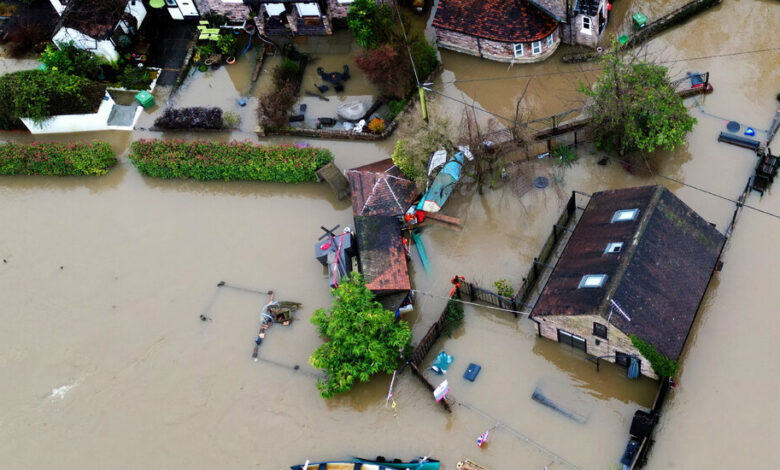
[ad_1]
In England, hundreds of flood warnings are in place.
Torrential rains that swept across parts of England overnight prompted a wave of weather alerts and travel disruptions early Friday, forecasters and officials said, warning that some rivers could see flooding continue for days.
Nearly 300 flood warnings, which indicate flooding is expected, were in place across England on Friday morning, according to Britain’s government. The warnings targeted villages and bodies of water from the Midlands to the eastern and southern coasts.
Officials also issued hundreds more flood alerts, which suggest possible flooding, for various communities and rivers.
Sustained flooding was also probable along parts of the River Severn, the longest river in Britain, and the River Trent, in the Midlands, over the next five days. Parts of the River Thames, which flows through London, could see flooding from Saturday until Monday.
While rain this time of year in England is not uncommon, an unsettling storm rushed across Southern England on Thursday, bringing heavy swaths of rain.
Officials for the Great Western Railway said on Thursday that flooding had closed several routes, causing headaches for passengers. By early Friday, the railway company was delivering more bad news, telling passengers that it was still experiencing significant disruptions in its network because of flooding in multiple locations.
Officials in Nottinghamshire County, in the Midlands, declared a major incident because of flooding along the Trent River on Thursday. A shelter was set up for those whose homes were flooded or were at risk of flooding.
In East London, around 50 people were evacuated Thursday because of rising waters, according to the London Fire Brigade. Ten fire engines and about 70 firefighters were called for flooding in the area. Images on social media showed water covering roadways and sidewalks.
The weather conditions in the city also appeared to sink a party boat near Temple Pier, about a mile up the Thames from Westminster.
Jorge Gallardo, who owns Bar & Co., the business that operated on the vessel, said on Friday that he had been running the bar for 15 years and was upset at its demise. Images of the scene showed London’s skyline in the background looming behind a partially submerged boat with its mast jutting from the water.
In France, too, people have fled rising water.
Across the English Channel, TV stations and news websites in France broadcast images this week from the far north of the country showing people wading waist-deep down the middle of the street, water rushing through living rooms and restaurants, and rescuers collecting residents in inflatable boats and tractors.
Worst hit was the region of Pas-de-Calais, where more than 2,000 households and nearly 60 businesses were impacted by floods, according to the local prefecture. Since Saturday, fire services and local governments have conducted more than 700 evacuations.
On Friday, the region was offered a reprieve, as the water levels receded and the French national meteorological service, Météo France, downgraded its flood status from the highest alert level. But the government information service on floods said that rain expected along the northern coast could “slow down the decline and even cause further increases in river levels.”
Some 500 homes remained without electricity, the prefecture said.
Many residents said they were exhausted, having just recovered from serious flooding in November.
The French environment minister, Christophe Béchu, promised an “exceptional response” while visiting the affected areas on Thursday, according to Le Parisien. He estimated more than 100 million euros would be spent on flood prevention in the region, the newspaper reported.
He was joined by the French government spokesman Olivier Véran, who indicated that climate change played a role in the repeated floods. “It is feared that every year there will be more fires in summer, more floods in winter,” he said on RMC radio.
In Germany, days of rain have left dams overflowing.
With continuous heavy rain causing widespread flooding, the German army was deployed to help reinforce dikes in the Eastern state of Saxony-Anhalt on Friday. The authorities declared emergencies in several areas around the country as high-running rivers flooded villages and farmland. After more than a week of heavy rain, dikes and temporary dams have become ineffective in some regions.
The flooding has affected many areas from Bavaria in the south to Saxony-Anhalt in the east and North Rhine-Westphalia in the west. Chancellor Olaf Scholz has made several trips to affected areas to assess the damage and thank first responders.
The tiny village of Schenkenschanz, a part of Kleve in the Western state North Rhine-Westphalia, turned into an island when a river flooded surrounding fields and cut off roads. Like many people in the affected areas, residents had to rely on boats to get out of their villages.
On Friday morning, Germany’s national weather service lifted a heavy rain warning, saying that while more precipitation was expected, some of it would come in the form of snow as temperatures dipped below freezing.
Christopher F. Schuetze contributed reporting from Hanover, Germany. Catherine Porter contributed reporting from Paris.
[ad_2]
Source link




